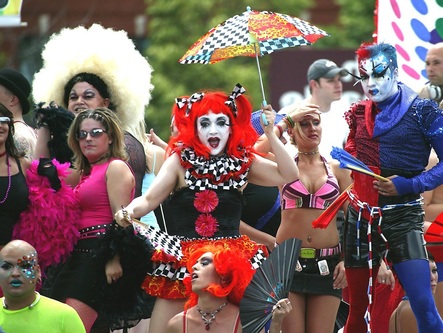The recent Queer Pride March held in the capital last month questioned the existence of equal rights in our society as hundreds of gays and lesbians gathered to protest against discrimination, demanding their right to live a life of dignity. The first gay pride parade was held in New York City in 1969 which marked the beginning of modern gay rights movement. Various pride parades have since been successfully organized in various countries such as South Africa, India, Israel, Taiwan, Bulgaria, France, Germany, Russia and Spain, to name a few. Though each parade celebrates life in a festive mood, the variation is largely dependent on the political, economic and religious settings of the area. Even the most festive ones however, dedicate some aspect of the march towards victims of AIDS and anti-LGBT violence.
Acceptance and equality remains a struggle for these sexual minorities as they are targeted and oppressed in all parts of the world. Many imminent politicians, individuals continue to express their opinions against homosexuals and gay marriage. The belief that it’s unnatural and a sin in the eye of a god restricts many to follow a path where everyone is treated equal in our society. Psychological theories suggest that homosexuality can be explained by a person’s environment. Whereas, biological studies suggest that genetic explanation is possible to some extent for different sexual preferences. Various studies have since been undertaken to prove that homosexuality is very much a part of our society and must not be overlooked as a disease or a mental disorder.
Despite India being a conservative society, it has been successful in organizing its 5th gay parade this year. However, this change was not easy as opposition was faced as the political party BJP expressed its disagreement with the concept of a gay pride parade back in 2008. The very next day, Prime Minister Manmohan Singh appealed for greater social tolerance towards homosexuals at an AIDS event. Support from the government and victory came as a high court in the Indian capital, Delhi ruled on 2 July 2009, that homosexual intercourse between consenting adults was not a criminal act, which until then had been an offense punishable by up to 10 years in prison. Many still don’t consider homosexuals as a part of our society expressing disgust and disagreement. Most of them base their opinions out of religious beliefs or just due to society norms. It’s because of these social stigmas that millions of people in India would still prefer to stay hidden in the ‘closet’ rather than live a life of dignity, where they are equal before the law for who they really are.
Acceptance and equality remains a struggle for these sexual minorities as they are targeted and oppressed in all parts of the world. Many imminent politicians, individuals continue to express their opinions against homosexuals and gay marriage. The belief that it’s unnatural and a sin in the eye of a god restricts many to follow a path where everyone is treated equal in our society. Psychological theories suggest that homosexuality can be explained by a person’s environment. Whereas, biological studies suggest that genetic explanation is possible to some extent for different sexual preferences. Various studies have since been undertaken to prove that homosexuality is very much a part of our society and must not be overlooked as a disease or a mental disorder.
Despite India being a conservative society, it has been successful in organizing its 5th gay parade this year. However, this change was not easy as opposition was faced as the political party BJP expressed its disagreement with the concept of a gay pride parade back in 2008. The very next day, Prime Minister Manmohan Singh appealed for greater social tolerance towards homosexuals at an AIDS event. Support from the government and victory came as a high court in the Indian capital, Delhi ruled on 2 July 2009, that homosexual intercourse between consenting adults was not a criminal act, which until then had been an offense punishable by up to 10 years in prison. Many still don’t consider homosexuals as a part of our society expressing disgust and disagreement. Most of them base their opinions out of religious beliefs or just due to society norms. It’s because of these social stigmas that millions of people in India would still prefer to stay hidden in the ‘closet’ rather than live a life of dignity, where they are equal before the law for who they really are.
“In the practice of tolerance, one’s enemy is the best teacher.”
- Dalai Lama





 RSS Feed
RSS Feed